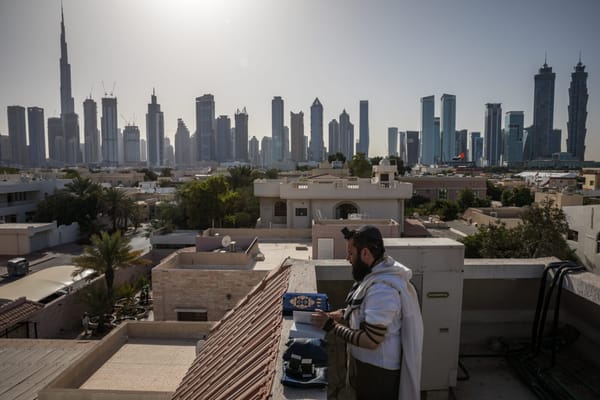Here we go again. A Baathist dictatorship is widely suspected and pointedly accused of an indefensible act. The United States, backed strongly by a European ally on the UN Security Council, is pressing the “international community” to penalize and isolate that regime until it makes “a strategic decision to fundamentally change its behavior.” Off the record, US officials allude to a more far-reaching agenda. As one “senior US policymaker” told the Washington Post on October 23: “The big question is: Is there anything to indicate that [Syrian President Bashar al-Asad] would show any deviation from past behavior? We’re certainly not trying to save the regime.”
Taking the hint, Russia and China have so far resisted US pressure to sanction Syria for its grudging and partial acquiescence in the demands of Detlev Mehlis, the UN-appointed investigator of the February 2005 assassination of Rafiq al-Hariri, ex-premier of Lebanon. But their signatures are on the unanimous UNSC Resolution 1636, which leaves open the possibility of “further action” if Mehlis is not satisfied. The Syrian president, also reading the tea leaves, has indicated the regime might comply with the investigator’s requests, but with a caveat: “Whatever we do, and no matter how much we cooperate, after a month, the result will be that we did not cooperate. We should appreciate this fact.”
This observation came halfway through a speech at Damascus University in which Asad identified Syria as “targeted” by an enemy whose message is: “Kill yourself or I will kill you.” There is no difference between these two options, the Syrian leader continued, except that “if you kill yourself, the enemy deprives you…of the honor of defending yourself.” He warned students in the audience that the “theorists of the war [against Syria] are pinpointing our youth” because youths did not live through the decades when Syria remained “steadfast in the face of tornadoes.” Now Syrians should hunker down for a protracted confrontation, because in the present circumstances “resistance and steadfastness” are the only alternative to chaos. Here Asad was clearly referring to post-Saddam Iraq, and perhaps echoing Deputy Foreign Minister Walid Mu‘allim’s complaint reported in the October 26 edition of the pan-Arab daily al-Hayat. The Mehlis investigation, Mu‘allim said, is a “tool” for implementing a master plan: “The Arab region is threatened by a second Sykes-Picot that will divide us on the basis of ethnicities and religions.”
Of course, Washington’s bones of contention with Damascus do number more than the regime insiders fingered in the unredacted version of the October 21 Mehlis report. The Bush administration, which pronounced itself “appalled” by Asad’s speech, probably was glad to hear it and may even have aimed to produce it. The letter of demarche delivered by Ambassador Margaret Scobey upon leaving Damascus after Hariri’s killing, the summertime cross-border raids that reportedly killed several Syrian soldiers, the rebuff of Syria’s offer to resume post-September 11 intelligence sharing on al-Qaeda, and now the cutoff of nearly all bilateral ties have all been attempts to erect hurdles upon which Syria will stumble as it comes before the Security Council. The US does not need to entertain the Libyan-style deal that Syria hopes for because of the strength of the international consensus behind Mehlis. As with Saddam Hussein’s Iraq, Washington is meanwhile signaling to Asad’s regime that it faces an existential threat, counting on the regime, in turn, to lash out in response. Damascus, so far, has obliged.
Undoubtedly, the Bush administration’s belligerent policy should be resisted, but the question is how. As the UN awaits the second installment of the Mehlis report, due on December 15, the danger is that blowhard rhetoric from both Damascus and Washington will create the illusion that the choice is between damaging sanctions (or worse) and defense of a sclerotic dictatorship with a dangerous siege mentality. The Clinton and Bush administrations played expertly with the terms of this false choice vis-à-vis Iraq, with the painfully ironic result in the spring of 2003 that much of the anti-war and anti-sanctions left applauded a French initiative to roll over sanctions as a way of averting war.
The choice is not between punishing all of Syria and shoring up the regime. Sanctions, if they are warranted by the evidence and made necessary by regime intransigence, should be directed carefully at those who are shown to be culpable -- and only them. The experience of Iraq in the 1990s proves that more extensive measures not only lead to humanitarian crisis, but also fail to achieve either “behavior-changing” or regime-changing objectives since they debilitate the very people who presumably are supposed to impel the regime to change. This much, by now, ought to be common sense.
One would think, moreover, that the experience of Iraq in the 2000s would caution even the self-styled revolutionaries in the Bush administration to think more modestly about what their version of regime change can bring. It may usher in a different authoritarian regime: Knight Ridder has reported on classified study commissioned by the office of Director of National Intelligence John Negroponte concluding that a coup in Damascus would install a harder-line junta than Asad’s inner circle. Or, as in Iraq, regime change may induce the collapse of the entire state -- a development that an old-school realist like Negroponte must have regretted during his tenure as ambassador in Baghdad.
Of course, sociologically and historically, the Bush administration’s initial vision of regime change was a sheer fabrication. Simply ridding a country of a dictator and his top 54 lieutenants is not destined magically to institute a liberal democracy, one that can be marketed and consumed across the region like any other American product. However, to the extent that war critics now blame the US for failing to institute “real democracy” in Iraq, they too are trapped in, and thereby lend credence to, the discourse of instant democratization. The Bush administration has certainly trumpeted each “milestone” in the post-Saddam political transition to demonstrate “progress” to skeptical Americans. But the problem with US-sponsored democratization is precisely that, for Iraq itself, each of these “milestones” has been considerably more than a public relations exercise. Each stage of the transition, though arguably making Iraq more democratic, has served to further polarize the country along sectarian and ethnic lines, suggesting that a more deliberate and less ambitious process might have been better for all concerned. But this was not to be: despite the vocal dissent of (at least) 22 percent of the voters, the draft constitution that passed the October 15 referendum will decisively shape the new Iraqi reality.
The Iraqi constitution was written on a US timetable, and partly by Iraqi politicians with US bodyguards, but in very few respects is it the document Washington would have drafted. While the language is vague, articles on the economy seem to commit the nascent state to providing universal health care and free higher education. Muslim clerics and religious scholars could assume a role in the highest court in the land, and the federalism provisions mean that personal status matters in some parts of the country could be adjudicated in religious, rather than civil, courts. The form of federalism established by the constitution is so loose that Baghdad might never really govern the whole country again. That fact in itself is innocuous, but since it was imposed by the Kurdish and Shi‘i religious parties rather than agreed upon by consensus, it is fueling the low-grade civil war that has intensified in 2005. From the official US point of view, therefore, the constitution greatly complicates the exit strategy. Knowing full well that the constitution would sharpen Iraq’s internal divisions, and in particular would confirm anti-federalist Sunni Arabs in their suspicion that participation in formal politics would not equate to an actual voice, the US scrambled throughout to soften its terms. A phone call from Bush himself did not dissuade the Supreme Council for the Islamic Revolution in Iraq from its newfound embrace of federalism. While a last-minute deal set up a committee for revising the constitution after the December 15 elections for a permanent government, actually revising the document would require a complete turnaround in the present balance of political power.
Despite yet more polls showing that Iraqis believe the US presence to be a cause of the insurgency rather than its remedy, the de facto exit strategy is therefore to assist the Kurds and the Shi‘i religious parties in defeating their political opponents, as well as the insurgents. The victors in the January 2005 elections do not yet believe they can secure the gains of the constitution without their foreign protector, who is also winking at such “facts on the ground” as the rapidly “Kurdifying” vicinity of oil-rich Kirkuk. At the request of the transitional prime minister, Ibrahim Jaafari of the Da‘wa Party, and the transitional president, Jalal Talabani of the Patriotic Union of Kurdistan, on November 8 the Security Council very quietly authorized an extension of the mandate of the “multinational force” in Iraq until December 31, 2006. Secretary of State Condoleezza Rice appeared before Congress to present a new strategy to “clear, hold and build” towns controlled by guerrillas, and Sen. John McCain (R-AZ) took a break from his advocacy of a ban on torture by US forces to plead for deployment of 10,000 more US soldiers to Iraq. The pieces are in place for the indefinite, steady escalation of the war -- a trend that is closely related to both the US isolation of Syria and Bashar al-Asad’s yelp of defiance.
The best-laid plans for regime change in both Syria and Iraq, of course, may very well be derailed by belated democratic upheavals in the United States. Three years after the fact, Bush’s Iraq adventure is now completely entangled in the web of falsehoods the administration spun to frighten Americans into backing the invasion of a country that posed no conceivable threat to them. A mid-November Washington Post poll reveals that 60 percent of Americans now believe the invasion of Iraq was not “worth it.” Nearly 3 in 5 voters in the poll think that Bush himself is dishonest. Slowly, this outpouring of discontent is trickling into the collective consciousness of Democrats, some of whom now realize they need to say something about Iraq besides insist that they would prosecute the war more effectively if they were in charge.
Egged on by McCain and the war’s inveterate cheerleaders at the Weekly Standard, Bush is trying to fight back, reminding audiences of how many Democrats voted for his October 2002 war resolution and smearing those who didn’t as people who “didn’t support the liberation of Iraq.” But these rearguard tactics will not work. The White House’s wild and willful distortions of the danger of Saddam Hussein’s illicit arsenal are on trial in the court of opinion, even if they are never aired in the courtroom of the prosecutor investigating the leaked identity of ex-CIA agent Valerie Plame. After the prosecutor’s indictment of Scooter Libby, former chief of staff for Vice President Dick Cheney, on charges of perjury and obstruction of justice, there is no perfuming the smell of a rat. Why would this most secretive of aides to the most secretive of government officials blow Plame’s cover? The White House had something to hide and it wanted to make sure no one else inside government lifted the curtain.
In light of everything else the Bush team has gotten away with, the prospect of penalty for just one of them, and for such a minor, sordid offense, offers only the grimmest of satisfaction. Libby is charged with participating in a cover-up of a cover-up of the real crime -- the manufacture of a “mortal threat” to justify an illegal and unnecessary war. Much more than the long promised second phase of the Senate Intelligence Committee report is necessary to ensure that others in the venal crew in the White House are eventually held to account. Meanwhile, rattled as they are by the scandals of their second term, the Bush administration is still pursuing the first term’s “transformational” Middle East policy, though thus far by different means, as if it has been a success. On the questions of Syria and Iraq, as well as Israel-Palestine and other issues, the imperative is therefore not just to hope for more indictments and another tumble in the polls, but to articulate clear, principled alternatives as well.
Written by
This article was published in Issue 237.









